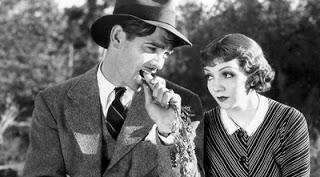
"I come from a long line of stubborn idiots."
Frank Capra's It Happened One Night (1934) codified the modern romantic comedy, though it offers far more than that suggests. The movie presents a familiar story with impeccable flair, helped by iconic stars.Heiress Ellie Andrews (Claudette Colbert) flees her stuffy father (Walter Connolly), who disapproves of her marriage to explorer King Westley (Jameson Thomas). Fleeing to New York via bus, she runs into Peter Warne (Clark Gable), a reporter eager to restart his career. Peter convinces Ellie to let him write an "exclusive" story on their adventures, but their initial hostility turns into love.
We can thank (or blame) Capra and writer Robert Riskin for inventing so many tropes copied by legions of imitators. The plot provides the rich girl runaway with the stern father, the dashing interloper who becomes the true love, the temporary separation and reunion. It even incorporates that hoariest device of all, with Ellie abandoning her groom at the altar to run into Peter's arms. All it needs is a banal pop soundtrack and Julia Roberts or Meg Ryan smirking through the film.
Yet It Happened One Night operates at a far higher level of craftsmanship. Capra plays with genre tropes while immersing viewers in its milieu. The movie trades more subtly on class differences than Sullivan's Travels, or indeed other Capra epics. Ellie's so out-of-touch she tries spending money she doesn't have, making her an easy mark for conmen. She needs help from worldly bum Peter, who shields her from chiselers while teaching her the camaraderie of the road. The best scene features a lusty singalong on a bus, uniting disparate, desperate passengers in unlikely friendship.
Night doesn't match the screwball snappiness of Hawks or Sturges, but provides its own charm. Capra narrowly beat the Hays Code, with a shirtless Gable erecting the "walls of Jericho" in their dressing room, or Ellie stopping cars with her naked leg. They bicker like a married couple to throw off detectives, rehearsing what's certain to be a lively pairing. Capra's heroes are sexual without seeming crude, complementing romance with raw attraction. Ellie wouldn't be happier with King than her father's preferred choice, needing a man like Peter possessing both physical and personal charms.
Claudette Colbert won an Oscar playing Ellie, her blend of snappiness and vulnerability setting the standard for a century of romantic heroines. Clark Gable's roguish charm never worked so well, whether gnawing carrots or fast-talking editors, while striking perfect chemistry with his costar. Capra gives supporting players colorful bits: Alan Hale as a gabby conman; Walter Connolly, surprisingly sympathetic as Ellie's stern father; Roscoe Karns as an attentive jerk; Ward Bond, a cranky bus driver.
Today, Capra's best-known for populist parables which range from effective (Mr. Smith Goes to Washington) to cock-eyed (Meet John Doe). It Happened One Night works better without their ideological baggage, instead seeming remarkably mature for its time and genre. Its heroes aren't an ideal romance yet seem perfectly matched, with the contrivances endearing rather than hackneyed.

